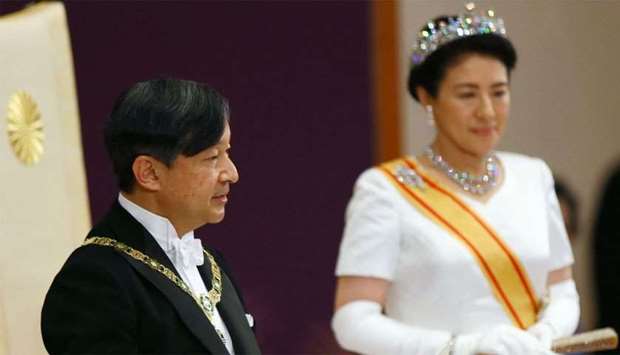Japanese Emperor Naruhito assumed the Chrysanthemum throne on Wednesday, saying he will fulfil his responsibility as a ‘symbol of the state and of the unity of the people of Japan’ as his country marked the beginning of a new era.
In his first address to the country, the 59-year-old emperor said: ‘[I] will act according to the constitution and fulfil my responsibility as the symbol of the state and of the unity of the people of Japan, while always turning my thoughts to the people and standing with them.’ The emperor's address came a day after his father Akihito renounced the throne, ending his 30-year reign with Japan's first abdication in 202 years.
Akihito, now emperor emeritus, ‘performed each of his duties in earnest for more than 30 years, while praying for world peace and the happiness of the people, and at all times sharing in the joys and sorrows of the people. He showed profound compassion through his own bearing,’ Emperor Naruhito said in a ceremony at the Imperial Palace.
About 290 people, including Empress Masako, imperial family members, Prime Minister Shinzo Abe and cabinet ministers attended the event, according to the Imperial Household Agency. However, Akihito and Empress Michiko, who has become empress emerita, were not present.
‘In acceding to the throne, I swear that I will reflect deeply on the course followed’ by the emperor emeritus, said Naruhito, who does not hold any political authority.
‘I sincerely pray for the happiness of the people and the further development of the nation as well as the peace of the world,’ he added.
Earlier in the day, the emperor attended his first ritual at the palace, inheriting the imperial regalia of sword and a jewel as proof of ascendance to the throne.
However, as only adult male imperial family members were allowed to attend the ritual, Empress Masako, the couple's daughter Princess Aiko and other female imperial family members were barred from the emperor's first official duty.
The Oxford-educated Naruhito formally became Japan's 126th emperor at midnight (1500 GMT Tuesday) as Japan marked the beginning of the new Reiwa Era.
Japan is in a festive mood with people celebrating the imperial succession and the arrival of the new era.
Some say Japan could not celebrate the last succession in 1989, which came with the death of Emperor Hirohito.
From a car window, the emperor and Masako, a former diplomat who graduated from Harvard, were waving smilingly at the crowd which cheered the couple from the roadsides. Many people also came to the palace, though they did not expect to see any of the imperial family members.
Just like Akihito and Michiko, the new imperial couple is popular, wearing casual attire, visiting disaster-hit areas in Japan and even being seen kneeling down to talk to residents affected by earthquakes and the 2011 tsunami.
Their popularity is also due to little criticism of the imperial family as Japan's educational institutions and media downplay or ignore critical views about the royal system, said Nobuyoshi Takashima, professor emeritus at the University of the Ryukyus on the southern island of Okinawa.
The agency said the public will have a chance to meet Emperor Naruhito, Empress Masako and other imperial family members on Saturday, when they are scheduled to appear on a palace balcony.
Japan lays claim to the world's oldest monarchy, stretching back more than 2,600 years, according to the government. However, the existence of legendary figures such as Emperor Jimmu, the country's first leader who reigned between 660 BC and 585 BC, has been contested.
Despite a festive mood, the imperial system faces huge challenges: Like shrinking, ageing Japan, the number of imperial family members has steadily declined.
Prince Hisahito, 12, the son of Crown Prince Akishino and Crown Princess Kiko, is the only male in his generation; the family has six unmarried female members, who would have to give up their royal status after marrying a man outside imperial circles, so the number of imperial family members is bound to dwindle further.
The female succession issue also lingers. The only child of Naruhito and Masako is Princess Aiko, 17. But she is not allowed to succeed to the throne under current law, which has drawn criticism from home and abroad.
Next in line is Prince Akishino, 53, Naruhito's younger brother, followed by Prince Hisahito.
The word ‘Reiwa’ for the new era consists of two Japanese kanji characters: ‘rei’ means ‘order,’ ‘command’ or ‘good,’ while ‘wa’ means ‘harmony.’

